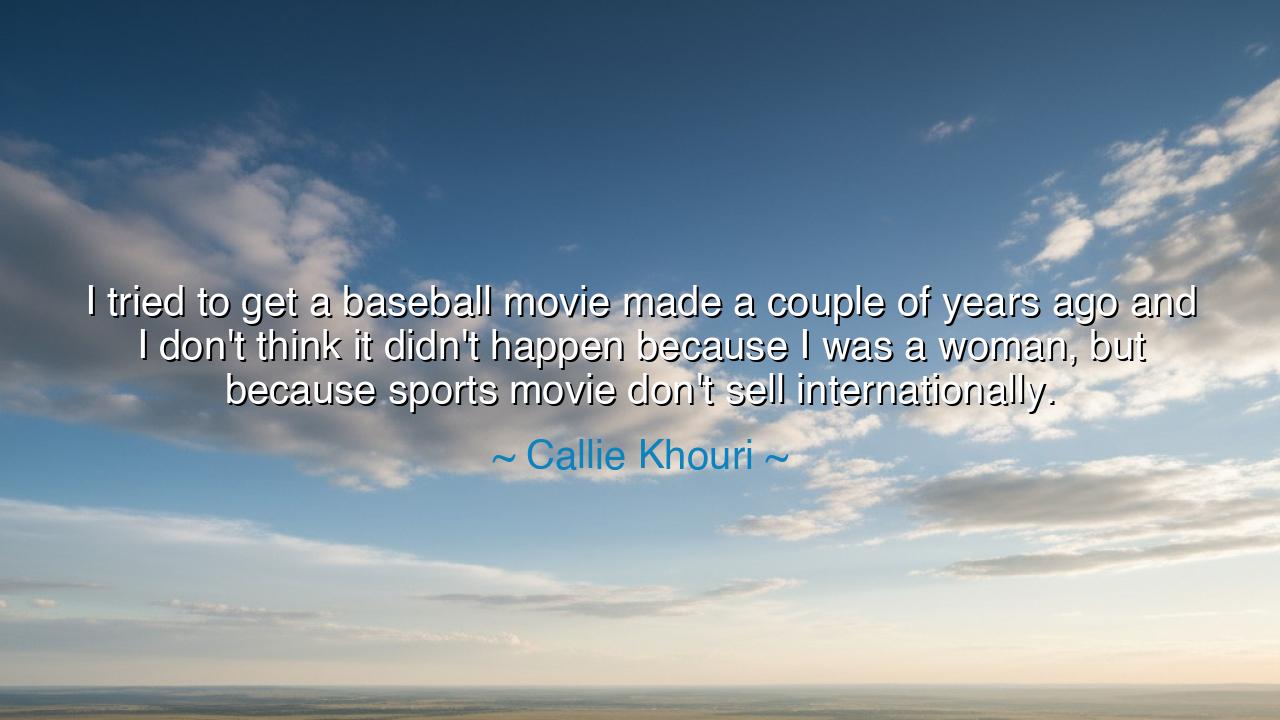
I tried to get a baseball movie made a couple of years ago and I
I tried to get a baseball movie made a couple of years ago and I don't think it didn't happen because I was a woman, but because sports movie don't sell internationally.






When Callie Khouri declared, “I tried to get a baseball movie made a couple of years ago and I don’t think it didn’t happen because I was a woman, but because sports movies don’t sell internationally,” she revealed both the struggle of the artist and the harsh realities of commerce. Her words carry the weight of a truth often hidden: that stories of passion, struggle, and triumph may be silenced not because they lack worth, but because they lack profit in the eyes of the market. It is a lament that even the noblest visions can be stifled when weighed upon the scales of commerce.
The ancients knew such conflict well. The poet who sang of heroes depended on patrons, and if his song did not please the powerful, it vanished into silence. The sculptor who dreamed of carving gods in marble could do nothing without the favor of rulers who funded the stone. Khouri’s words echo this ancient tension between art and commerce, between the calling of the soul to tell a story and the cold hand of economics that decides whether that story will be heard.
Her choice of baseball as subject is itself symbolic. Baseball has long been called America’s pastime, a mirror of community, patience, and rhythm. It embodies the national spirit, yet, as Khouri points out, it does not always travel across borders. What is sacred in one land may seem foreign in another. Thus, the story she wished to tell—a story rooted in a people’s heart—was deemed unfit for the global market. In this we hear the tragedy of modern storytelling: local truth sacrificed at the altar of universal sale.
History gives us a reflection in the tale of Sophocles. His plays were written for Athens, shaped by the city’s values, gods, and politics. Though they now echo across centuries, in his own time they were local offerings, tied to festivals and civic pride. Imagine if they had been dismissed because they did not appeal to foreigners—how much wisdom would we have lost? Khouri’s frustration is the same: the worth of a story cannot be measured solely by how it travels, but by how deeply it speaks to those who know its soil.
Yet, her words also carry resilience. She does not say the movie failed because she was a woman, though the path of women in storytelling has often been obstructed. Instead, she accepts the truth of the market while still naming the injustice—that art too often is judged not by its soul, but by its ability to cross oceans. There is strength in such clarity, for it reminds us that when obstacles appear, we must distinguish between prejudice and practicality, between personal dismissal and systemic constraint.
The lesson is clear: never measure the worth of your dream only by the world’s willingness to purchase it. A story, a song, a vision may be rejected by markets and yet endure in power. Many works once dismissed as unprofitable or provincial later became eternal. What matters most is that the story is spoken, even if only to a few, for in those few hearts it may take root and grow.
Practically, this means creators must hold fast to their truth. Tell your story even if it is small, even if it does not promise riches. Support others who dare to speak their visions, especially when the market deems them unworthy. And as audiences, let us not be bound by what the world sells us—let us seek out the local, the particular, the heartfelt, for in these lies the marrow of human experience.
Thus, Callie Khouri’s words shine as a teaching for all who labor in art and dream: do not let the market dictate the value of your story. For commerce sees numbers, but art sees souls. And though the world may turn away today, truth has a way of enduring, waiting for the time when ears are ready and hearts are open to receive it.






AAdministratorAdministrator
Welcome, honored guests. Please leave a comment, we will respond soon